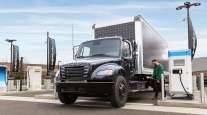Senior Reporter
FHWA Issues Requirements for EV Chargers — but Not for Trucks

[Stay on top of transportation news: Get TTNews in your inbox.]
The Federal Highway Administration has issued a final rule for minimum standards of electric vehicle chargers, but has chosen to not yet broaden the rule to include minimum standards for medium- and heavy-duty electric truck charging infrastructure.
The agency said it did not want to issue a final rule for these trucks so as to not “pre-empt the pace of the technological innovation.”
The FHWA decision is important to trucking trade groups and motor carriers who have in recent months expressed concerns that the needed electric charging infrastructure for commercial trucks will not be in place in time to comply with anticipated state regulatory mandates for the adoption of electric trucks.
“We’re disappointed that the rule didn’t address our comments related to the semi-private EV charging needs of fleets, consistent with IIJA,” said Paul Ruiz, director of energy and environmental affairs for American Trucking Associations. “We know that fleets will require consistent and reliable access to charging stations that are limited access — not open to the public — to enable a transition to medium- and heavy-duty electrification.”
He added, “Although we appreciate and agree that standards should keep pace with technological innovation, states, charging station grantees and fleet partners will need assurance that the specific needs of trucking are accounted for, even in the planning stages. As referenced in our comments, this includes in areas of hours of service, cybersecurity, alternative corridor signage for freight truck charging comparability, and in the specific charging needs of heavy-duty vehicles.”
In comments on the proposed charging guidelines rule last year, ATA said that as of June there were 1.45 million battery-electric light-duty vehicles registered in the U.S. However, as of December 2021 there were only 1,215 medium- and heavy-duty electric trucks in operation, and 140,000 on order.

Host Seth Clevenger chats with Evan Shelley, co-founder and CEO of TruckParkingClub. Hear the program above and at RoadSigns.TTNews.com.
In its Feb. 28 Federal Register post, FHWA touted the establishment of the final rule as providing a powerful antidote to electric infrastructure issues, helping create energy independence, and encouraging more widespread adoption of electric vehicles. The final rule said, “EV consumers will be more confident in the availability, safety and consistency of EV charging stations.”
But some commenters said by not specifically addressing the unique needs of medium- and heavy-truck EV charging in the regulation, FHWA would be “de facto discouraging investment in the needs of MD/HD electric vehicles.”
“Many commenters supported specifically addressing the needs of MD/HD EVs in addition to the needs of EV passenger vehicles,” the final rule said. “Several commenters identified the environmental, air quality, rural economy and equity benefits of ensuring that the applicability of the regulation addressed the needs and parameters of the evolving MD/HD EV sector.”
Some also noted that medium and heavy trucks are a growing EV sector that will require on-corridor charging, and suggested that the MD/HD requirements be designed to consider the future accommodation of power demands and site use/circulation needs of longhaul trucking.
Want more news? Listen to today's daily briefing above or go here for more info
“Other commenters requested that requirements address MD/HD EV charging needs immediately, with some suggesting that a certain number of federally funded EV charging parking spaces be designed to accommodate MD/HD needs,” FHWA said. “Many commenters identified an opportunity to coordinate MD/HD charging with required off-duty breaks for longhaul truckers.”
The agency said it will continue to monitor the technological advancements in the MD/HD industry for consideration as to whether further regulation is needed to provide applicable minimum standards and requirements at a future date.
The following are some of the requirements of the rule:
- In terms of standards for installation, operation and maintenance, charging stations are required to contain a minimum number of ports, types of connectors, payment methods and requirements for customer support services.
- Minimum requirements for training, and certification standards for technicians installing, operating and maintaining chargers to ensure consistency around quality installation and safety across the network.
- The agency said it is working to establish a seamless national network of EV charging infrastructure that can communicate and operate on the same software platforms from one state to another.
- FHWA vowed to address standards meant to allow for secure remote monitoring, diagnostics, control and updates. The requirements will help address cybersecurity concerns while mitigating against stranded assets.
- Information on publicly available EV charging infrastructure locations, pricing, real-time availability and accessibility though mapping applications.
.




